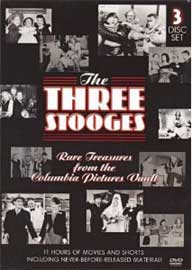 THE
THREE STOOGES: RARE TREASURES FROM THE COLUMBIA PICTURES VAULT (1935-1959)
THE
THREE STOOGES: RARE TREASURES FROM THE COLUMBIA PICTURES VAULT (1935-1959)Directors: Vernon Keays, David Lowell Rich, Del Lord, Jules White, Harry Edwards, and Edward Bernds
Sony Choice Collection
 THE
THREE STOOGES: RARE TREASURES FROM THE COLUMBIA PICTURES VAULT (1935-1959)
THE
THREE STOOGES: RARE TREASURES FROM THE COLUMBIA PICTURES VAULT (1935-1959)While many fans thanked Sony for remastering all 190 Three Stooges shorts, some were sort of disappointed that all eight sets of The Three Stooges Collection were barebones, meaning there were no extras (i.e., bonus shorts, commentaries, featurettes, annotated scripts, etc.). When Sony released The Buster Keaton 60th Anniversary Collection back in 2006, it included commentaries on all 10 shorts, a featurette indicating his silent years to the talkies, and an annotated script with an introduction by Keaton's granddaughter (I highly recommend this set, by the way). Thankfully, Sony has re-released a long-awaited set that was previously available only in the so-called Three Stooges Ultimate Collection (a re-packaging of the eight Stooges volumes) and under its Sony Choice Collection MOD label.

ROCKIN' IN THE ROCKIES (1945). This low-budget musical comedy is only worth watching for The Three Stooges, who appear in supporting roles, but don't play their usual characters. Moe plays Shorty Williams, a ranch foreman who co-owns a ranch with his cousin Rusty (Jay Kirby) upstate. He takes two vagrants (Larry and Curly) under his wing so they will be avoided being arrested by the local sheriff. At the same time, small-time singers June (Mary Beth Hughes) and Betty (Gladys Blake) find out that their train to their next gig is delayed, so along with a bumbling swing band The Hoosier Hotshots, they all head to the ranch, but when Rusty returns to the ranch the next day, he discovers the unwelcomed guests and orders them out, but Shorty convinces him to let them stay, which he reluctantly accepts. The Hoosier Hotshots spend the rest of the film's running time pestering music promoter Sam Clemens (Forrest Taylor), and the finale is basically a medley of music and comedy, as the entire cast performs ROCKIN' IN THE ROCKIES, based on the film's title.
Though mildly enjoyable, it seemed director Vernon Keays didn't really know what to do with the Stooges, as their slapstick is far between and it doesn't really blend well with the musical elements. Slapstick might not have been Keays's cup of tea, which might be another reason. Never before given an official home video release, with the exception of several VHS and DVD bootlegs, Sony releases this forgotten film from the original 35mm negative and presents it in the original full frame aspect ratio. The print looks clean and grain and print blemishes are kept to a minimum. The mono audio is in good condition.
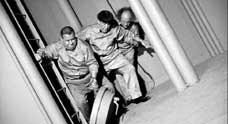 HAVE
ROCKET, WILL TRAVEL (1959). When the shorts department at Columbia closed down
in 1958 after tyrannical head Harry Cohn passed away, Moe and Larry decided
to keep their careers going by hiring Joe DeRita for the third stooge. DeRita
originally had his own series of two-reel comedies at Columbia in the late 1940s
and accepted the offer (DeRita was originally going to replace Shemp after his
death, but was unavailable by the studio). Their first outing is a lively mixture
of science fiction and slapstick comedy, but as you can tell Moe and Larry can't
seem to do the extreme kind now since they're getting on in age.
HAVE
ROCKET, WILL TRAVEL (1959). When the shorts department at Columbia closed down
in 1958 after tyrannical head Harry Cohn passed away, Moe and Larry decided
to keep their careers going by hiring Joe DeRita for the third stooge. DeRita
originally had his own series of two-reel comedies at Columbia in the late 1940s
and accepted the offer (DeRita was originally going to replace Shemp after his
death, but was unavailable by the studio). Their first outing is a lively mixture
of science fiction and slapstick comedy, but as you can tell Moe and Larry can't
seem to do the extreme kind now since they're getting on in age.
The Stooges play maintenance men who accidentally board a spaceship heading for the moon. A subplot has two smitten scientists (Anna Lisa and Bob Colbert) falling in love while they and their boss (Jerome Cowan) try to stop the ship. There's a few memorable scenes that have Moe, Larry and Curly Joe tangling with aliens and they even get miniaturized by a shrinking ray. The finale which takes place at a party might be a faint reminder to Stooges fans that they still have their comic timing and how it would have worked had they stayed at the shorts department. The film turned out to be a major success for Columbia and it warranted four more features with the team, the final outing being THE OUTLAWS IS COMING! in 1965.
Why Sony/Columbia never bothered to release HAVE ROCKET, WILL TRAVEL on DVD for so many years is beyond me, but they finally do now as they present in its original 1.85:1 aspect ratio with anamorphic enhancement. It seems to be from the original negative, since there's hardly any damage done to the print and only minor grain and speckling. The mono audio comes through nicely.
COLOR RHAPSODY CARTOONS 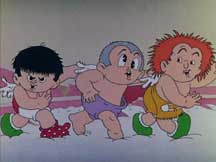
THE BON BON PARADE (1935)
A boy obsessed with candy, that attracts a fly, accepts an offer from a cherub
for a train to take him to a candyland where he can live full time. When he
arrives, a cupcake greets him and the boy meets a trio of cherubs that resemble
The Three Stooges. This version is a reissue, since I assume the original negative
no longer exists (Columbia didn't take good care of their cartoons and that's
why most of them can only be obtained by private collectors).
MERRY MUTINEERS (1936)
Two boys perform a battle of toy pirate ships in a pool. The crews on both vessels
consist of caricatures from famous 1930s stars including Charles Laughton, Jimmy
Durante, Wallace Beery, The Three Stooges and The Marx Brothers (I wonder how
they got permission from MGM to include them in this cartoon).
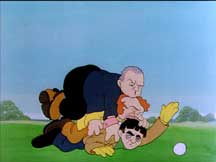 A
HOLLYWOOD DETOUR (1942)
A
HOLLYWOOD DETOUR (1942)
A travelogue short built around a cartoon. A John Barrymore caricature is constantly
being mobbed by a fan for an autograph. That's pretty much the whole thing.
All 3 cartoons are presented in their original full frame aspect ratios. BON
BON and MERRY MUTINEERS are reissues, while HOLLYWOOD is the original version,
but the Technicolor really stands out and the images are crystal clear, with
the exception of BON BON, which suffers from some scratches.
SHEMP HOWARD COLUMBIA TWO-REELERS (1938-1940) (Co-star appearances)
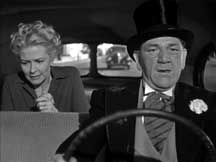
HOME ON THE RAGE (1938) is Shemp's first appearance in a Columbia short and he's teamed with Andy Clyde. Clyde started making Columbia shorts in 1934 and his series ended in 1956, resulting in 79 shorts. His output was a close second to the Three Stooges series. Andy's brother-in-law Happy (Shemp) pays him and his wife an unexpected visit and wants Andy to take part in an insurance policy. This makes Andy think that Happy and his wife are planning to kill him. A number of gags include Happy dragging Andy up the stairs with his head bouncing across the steps. The real showcase for his short is Andy's dog Penrod who gets his fair share of the laughs.
GLOVE SLINGERS (1939) was the first in a new series of comedy shorts at Columbia that concentrated more on story than the usual slapstick gags. The series revolved around aspiring boxer Terry Kelly (who was played by four different actors during the series' four-year stint). The first entry has boxing manager Pat Patrick (Shemp) and trainer Chuck (Paul Hurst) coming to live with Terry and his mother (Dorothy Vaughn). Terry discovers that his girlfriend's brother is his opponent in the upcoming fight. Fans of Columbia shorts will recognize a lot of regulars including Dick Curtis, Richard Fiske, Cy Schindell and Victor Travers.
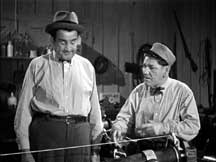 MONEY
SQUAWKS (1940) is another Andy/Shemp pairing. This time, instead of playing
enemy in-laws, they're friends who are hired to guard a $10,000 mine payroll
at a rural train depot by a gang of bank robbers. This short is highly enjoyable
because of Shemp and his way of always ad-libbing, but the short runs out of
steam towards the end as he disappears completely from the film and it concentrates
on a horse carriage chase (this was a way to edit stock footage from a 1935
Clyde short, OLD SAWBONES). One gag that stands out is when Andy and Shemp are
eating lunch and are constantly interrupted by a noisy bullfrog.
MONEY
SQUAWKS (1940) is another Andy/Shemp pairing. This time, instead of playing
enemy in-laws, they're friends who are hired to guard a $10,000 mine payroll
at a rural train depot by a gang of bank robbers. This short is highly enjoyable
because of Shemp and his way of always ad-libbing, but the short runs out of
steam towards the end as he disappears completely from the film and it concentrates
on a horse carriage chase (this was a way to edit stock footage from a 1935
Clyde short, OLD SAWBONES). One gag that stands out is when Andy and Shemp are
eating lunch and are constantly interrupted by a noisy bullfrog.
BOOBS IN THE WOODS (1940) has Andy and Shemp once again playing in-laws as Shemp gets him fired from his job at a music store and takes Andy and his wife on a camping trip. This short is infamous for having one slapstick gag after another and each one pays off thanks to Del Lord's impeccable direction. Look for Bud Jamison as Andy's boss who gets knocked out by a music instrument and Bruce Bennett as a park ranger who never stops writing out tickets to Andy.
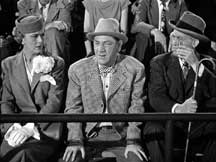
PLEASED TO MITT YOU (1940) is the second in the Glove Slingers series and was Shemp's final appearance in them (his role would be played later by Wally Vernon and Roscoe Ates). Terry (played this time by David Durand) is heading to college but decides to spend his final night throwing a farewell bash with his friends, only to get his traveling money stolen by his rival Diggins (John Kellogg). Terry, Pat and Chuck (played by Guinn "Big Boy" Williams) head to a nearby restaurant and a fight breaks out, only with boxing gloves, since the establishment has a no-tolerant policy of bare-knuckle fighting. One thing to look out for is a mistake that occurs early on, when Shemp pretends to accidentally cut his finger while slicing a potato, causing Williams to laugh directly at the camera.
SHEMP HOWARD COLUMBIA TWO-REELERS (1944-1947) (Solo series)
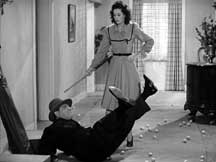 PICK
A PECK OF PLUMBERS (1944) is Shemp's first official two-reeler as a solo star,
but in this one, he's teamed with El Brendel, a comedian who always spoke with
a Swedish dialect, but it was a hit when he performed it in Vaudeville. He joined
the Columbia Shorts Department in 1936 and stayed there until 1944, when Jules
White terminated his contract after Harry Langdon (who appeared in his last
Columbia shorts with Brendel) died. This short really isn't very good because
El and Shemp spend too much time bossing each other around and it really goes
nowhere. The plot has them playing vagrants who are on trial for wrecking a
policeman's motorcycle and are given 48 hours to pay a $100 fine. They get jobs
as plumbers, something they know nothing about, and their first assignment is
to locate a ring that slid down a bathroom sink drain. They manage to destroy
the bathroom, disrupt a bridge party and ruin dinner until they finally retrieve
the ring at the end.
PICK
A PECK OF PLUMBERS (1944) is Shemp's first official two-reeler as a solo star,
but in this one, he's teamed with El Brendel, a comedian who always spoke with
a Swedish dialect, but it was a hit when he performed it in Vaudeville. He joined
the Columbia Shorts Department in 1936 and stayed there until 1944, when Jules
White terminated his contract after Harry Langdon (who appeared in his last
Columbia shorts with Brendel) died. This short really isn't very good because
El and Shemp spend too much time bossing each other around and it really goes
nowhere. The plot has them playing vagrants who are on trial for wrecking a
policeman's motorcycle and are given 48 hours to pay a $100 fine. They get jobs
as plumbers, something they know nothing about, and their first assignment is
to locate a ring that slid down a bathroom sink drain. They manage to destroy
the bathroom, disrupt a bridge party and ruin dinner until they finally retrieve
the ring at the end.
OPEN SEASON FOR SAPS (1944) is a remake of Charley Chase's THE GRAND HOOTER (1937). Shemp returns very late at night from a lodge meeting and receives a less-than-cordial greeting from his domineering wife (Early Cantrell). To make it up to her, Shemp decides to take her on a second honeymoon, but when they get to the hotel, Shemp gets mixed-up with a neighbor (Christine McIntyre) and her sword-wielding husband (George Lewis). Shemp has a funny scene where he dresses up as a Senorita and even sings a song. Sort of dreadful since I prefer the original Chase version.
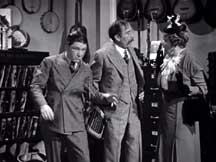
OFF AGAIN, ON AGAIN (1945) is a remake of another Charley Chase comedy, TIME OUT FOR TROUBLE (1938), and once again, I prefer the original version. This might be the most blatant remake Columbia made considering every scene is identical to the Chase version. Continuity issues appear when Fred "Snowflake Toones and Bud Jamison appear in stock footage and Shemp is made up to look like Chase, even though he looks nothing like him. Dick Curtis reprises his role as the gangster since he also played him in the original 1938 version.
WHERE THE PEST BEGINS (1945) is more standard Columbia slapstick, but it's rewarding thanks to the teaming of Shemp and Tom Kennedy and a script by Edward Bernds and his friend Russell Malmgren. Kennedy plays Jonathan Bates, a scientist working for the U.S. Government, who makes the biggest mistake of his life by moving next door to the most obnoxious person of a neighbor (Shemp). A number of violent gags included are when Kennedy's foot gets crunched by a car tire and a sequence that has to be seen to be believed as Kennedy falls into a barrel. An OK short that's unfortunately marred by Harry Edward's incompetent direction.
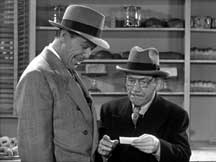 A
HIT WITH A MISS (1945) is none other than a remake of the classic Three Stooges
short PUNCH DRUNKS, and even the Stooges themselves (simply credited as Howard,
Fine and Howard) receive story credit. Shemp takes the role of the prizefighter
with former Hal Roach collaborator Charley Rogers playing the professor and
Robert Williams is the gruff leader. Joe Palma plays the boxing opponent. You
may recognize Larry Fine (thanks to stock footage and bad editing). Fans may
prefer the original Stooges version, including me, but Shemp fans will enjoy
it.
A
HIT WITH A MISS (1945) is none other than a remake of the classic Three Stooges
short PUNCH DRUNKS, and even the Stooges themselves (simply credited as Howard,
Fine and Howard) receive story credit. Shemp takes the role of the prizefighter
with former Hal Roach collaborator Charley Rogers playing the professor and
Robert Williams is the gruff leader. Joe Palma plays the boxing opponent. You
may recognize Larry Fine (thanks to stock footage and bad editing). Fans may
prefer the original Stooges version, including me, but Shemp fans will enjoy
it.
MR. NOISY (1946) is another Charley Chase remake of THE HECKLER (1940), but this entry is considered to be the best of the Shemp series since the material really suits him, as it didn't really work for Chase. Shemp plays an obnoxious spectator at a tennis (and later a baseball) game who loves heckling players and even the people sitting beside him, but at the baseball game, two gangsters want him to thwart the victory of a player at the next day's game. With Shemp dressed up like an Eskimo, he manages to succeed, but gets chased by the gangsters at the end.
JIGGERS, MY WIFE (1946) has Shemp erroneously teamed with Tom Kennedy (who receives above-the-title billing) since he only appears in the short's first half. I always thought this was a sequel to OPEN SEASON FOR SAPS, since Shemp and Early Cantrell both reprise their roles. This is yet another marital farce that has Shemp getting mixed-up with a pretty neighbor (Christine Mcintyre) and faces the wrath of her husband (Cy Schindell). Not much more can be said since it ends very predictably.
SOCIETY MUGS (1946) is another Shemp/Kennedy pairing and is a remake of another Stooges classic, TERMITES OF 1938 (1938). Shemp and Tom play the roles of exterminators who are mistaken for male escorts at a dinner party. It has the usual scene-by-scene gags and includes Gene Roth's first appearance in a Columbia short as a smug butler. It's sort of hard to recommend this one since both versions are just so-so.
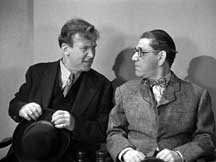
BRIDE AND GLOOM (1947) is the final short and film with Shemp as a solo star. He was called back by Moe and Larry to fill in for Curly shortly after filming ended. This is another Charley Chase remake, this time THE AWFUL GOOF (1939) with Shemp as a groom desperately trying to make it to his own wedding. He gets sidetracked when he drenches a lady (Christine McIntyre) thanks to slamming into a fire hydrant. Since he's also a real estate agent, he makes the mistake of renting out a house to the lady and her jealous husband (Dick Curtis). Though it's considered to be another good one in the Shemp series, it's not as funny since Shemp seems to plays it straight and the slapstick is kept to a minimum. This short was actually released two weeks after Shemp's first Columbia short with the Stooges, FRIGHT NIGHT.
JOE BESSER COLUMBIA TWO-REELERS (1949-1956) (Note: Joe Besser made a Columbia short in New York in 1938 entitled CUCKOORANCHO, but that short is not included in this set.)
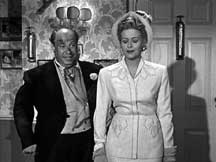 WAITING
IN THE LURCH (1949) features Joe as a man who loves to chase fire engines, but
it takes its toll when he misses his own wedding to his bride (Christine McIntyre).
He makes a promise to her that he will not chase anymore fire engines, but he
ends up doing it again and his bride decides to marry another man (Rodney Bell).
With the help of his loyal servant (James Logan), he manages to win her back
by sabotaging the wedding. This was the only Besser short directed by Edward
Bernds, since Jules White would helm the rest of his comedies from here on in.
It was remade much better in 1954 as THE FIRE CHASER.
WAITING
IN THE LURCH (1949) features Joe as a man who loves to chase fire engines, but
it takes its toll when he misses his own wedding to his bride (Christine McIntyre).
He makes a promise to her that he will not chase anymore fire engines, but he
ends up doing it again and his bride decides to marry another man (Rodney Bell).
With the help of his loyal servant (James Logan), he manages to win her back
by sabotaging the wedding. This was the only Besser short directed by Edward
Bernds, since Jules White would helm the rest of his comedies from here on in.
It was remade much better in 1954 as THE FIRE CHASER.
DIZZY YARDBIRD (1950) has an interesting history since Felix Adler had written the script for it in 1941 as WHAT A SOLDIER! and originally intended it as a Buster Keaton comedy. The script was shelved when Keaton left Columbia until 1949 when Jules White decided to make it with Besser, changing the title to DIZZY YARDBIRD. It's a standard service comedy where Besser humorlessly clashes with his no-nonsense sergeant (Dick Wessel) with the usual slapstick gags you've seen before. Emil Sitka also stars as one of the cadets who's given no lines, unfortunately. It would be remade very poorly in 1955 as G.I. DOOD IT.
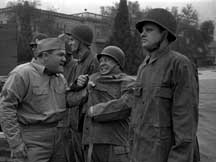
FRAIDY CAT (1951) is the first Besser short where he is teamed with Jim Hawthorne, a local TV and radio personality who was hired by Jules White as Besser's straight-man. This short is another remake of a classic Stooges short, DIZZY DETECTIVES (1943), and even though I like the Stooges version better, the remake is OK, considering the chemistry between Besser and Hawthorne. It was remade as HOOK A CROOK (1955).
AIM, FIRE, SCOOT (1952) has Joe and Jim as draftees in the army, where they once again clash with their sergeant (Henry Kulky) and woo a female officer (Angela Stevens). This is a semi-reworking of the Stooges short BOOBS IN ARMS (1940) with the usual rehash of gags. Remade as ARMY DAZE (1956), which is actually better, in my opinion.
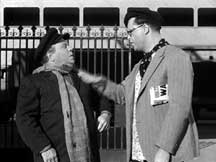 CAUGHT
ON THE BOUNCE (1952) is the funniest of the series as Joe is a family man who,
along with his wife (Maxine Gates) and son (Edward Coch Jr.) travel by train
to meet up with his aunt (Esther Howard) to ask to give them a loan on their
house. It is funnier compared to other domestic slapstick comedies Columbia
put out over the years. Jules White once again adds the usual train car gags
including a scene where Gates flattens a porter after falling out of her bunk.
Gates adds a lot of comedy to the short and other ones she starred in (see the
Stooges' MUSCLE UP A LITTTLE CLOSER for proof).
CAUGHT
ON THE BOUNCE (1952) is the funniest of the series as Joe is a family man who,
along with his wife (Maxine Gates) and son (Edward Coch Jr.) travel by train
to meet up with his aunt (Esther Howard) to ask to give them a loan on their
house. It is funnier compared to other domestic slapstick comedies Columbia
put out over the years. Jules White once again adds the usual train car gags
including a scene where Gates flattens a porter after falling out of her bunk.
Gates adds a lot of comedy to the short and other ones she starred in (see the
Stooges' MUSCLE UP A LITTTLE CLOSER for proof).
SPIES AND GUYS (1953) is another war comedy in which Joe and his sergeant (Murray Alper) try to infiltrate enemy territory. Joe and a female officer (Angela Stevens) are held captive until Stevens exposes herself in a bathing suit that distracts them as they get knocked out by Joe. Emil Sitka appears uncredited as the enemy leader. A funny short and a lot better than the other service comedies Besser starred in.
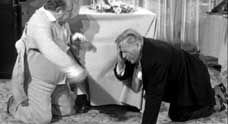
THE FIRE CHASER (1954) is a remake of 1949's WAITING IN THE LURCH. The new footage features a injured Joe who's being sued by his father-in-law (Vernon Dent). He tells the story to his pretty nurse (Barbara Bartay), unaware that his wife (Christine McIntyre) is right outside his room. Also in the new footage is a much better chase scene featuring Besser, Dent (in his last Columbia short) and Rodney Bell. A lot better than the original version thanks to Jules White rewriting it.
G.I. DOOD IT (1955) is a disappointing remake of DIZZY YARDBIRD. The new footage is mostly comprised of Besser's pet dog (voiced by him) reminiscing about how Joe joined the army. The talking dog sequences might remind viewers of the famous Dogville comedies that Jules White and Zion Myers did at MGM in the early 1930s. Nothing special and might be worth skipping if you don't like this type of comedy.
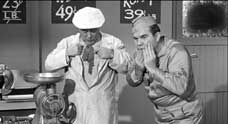 HOOK
A CROOK (1955) is a remake of FRAIDY CAT (1951). The short is pretty much 100%
the same as the original, but fans will enjoy a brief scene with Columbia short
favorite Dudley Dickerson as a janitor who gets spooked by the gorilla (played
in the new footage by future BONANZA star Dan Blocker) and runs off in terror
and another ending scene in which Besser and Hawthorne are knocked out by the
gorilla and a socialite kisses it and then faints.
HOOK
A CROOK (1955) is a remake of FRAIDY CAT (1951). The short is pretty much 100%
the same as the original, but fans will enjoy a brief scene with Columbia short
favorite Dudley Dickerson as a janitor who gets spooked by the gorilla (played
in the new footage by future BONANZA star Dan Blocker) and runs off in terror
and another ending scene in which Besser and Hawthorne are knocked out by the
gorilla and a socialite kisses it and then faints.
ARMY DAZE (1956) is the final Besser short and a remake of AIM, FIRE, SCOOT (1952). New footage includes privates Joe and Jim meeting up with the sergeant and his girlfriend (Angela Stevens) resulting in a mini-food fight and a fight scene at the end where they capture two spies in the major's office.
JOE DERITA COLUMBIA TWO-REELERS (1946-1948)
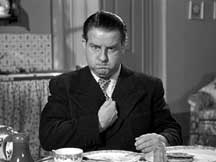
SLAPPILY MARRIED (1946) is the first of four shorts DeRita made with Columbia and is considered to be the best of all of them. This short is a remake of Andy Clyde's A MAID MADE MAD (1943). Joe plays a happily-married husband who discovers today is Friday the 13th and refuses to go to work to avoid catastrophes of any kind. His wife (Christine McIntyre) says it's only a superstition and tells Joe to start making breakfast, but it doesn't go as planned as Joe gets splattered with food, dishes fall and break all over the place, and a mixing bowl full of waffle batter plasters Joe's Shemp-like hair! Later, at his dress shop, Joe gets mixed up with a female customer (Dorothy Granger) and her jealous husband (Dick Wessel) and gets manhandled by him and this causes Joe's wife to walk out on him. He eventually tracks her down at the Amazon Hotel, which is only for women, as Joe is forced to disguise himself to find her room. He blows his cover as he finds himself in the female customer's room and gets chased by the jealous husband and a hotel matron until finally reuniting with his wife at the end.
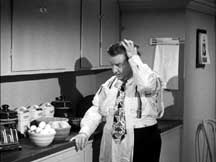
THE GOOD BAD EGG (1947) is another remake of an Andy Clyde short, KNEE ACTION (1937). Here, Joe is a hapless inventor who marries a single woman with the help of her phone number written on an egg, but it turns out she has an obnoxious son, Rudolph, who makes Joe's life miserable, but that doesn't stop him from working on his latest invention, a state-of-the-art clothes washer, but Rudolph destroys it by replacing a part in it, causing wet soapy clothes to fly all over the room. An enjoyable short, but not totally worth recommending.
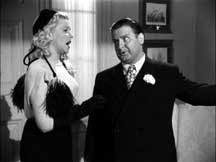
WEDLOCK DEADLOCK (1947) is a remake of an elusive short called UNRELATED RELATIONS (1936) starring Monte Collins. Joe and his newlywed wife (Christine McIntyre) get settled in their new house when her obnoxious in-laws (Esther Howard, Patsy Moran and Charles Williams) drop in unexpectedly and move in with them. This short is another one considered to be great because of the cast, but it suffers because of DeRita's acting skills. Joe and his wife enlist the help of his friend (William Newell) and his wife (Dorothy Granger) to rid out the in-laws, until the two have plans of moving in with them as well!
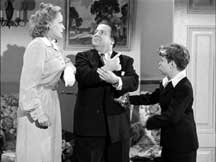
JITTER BUGHOUSE (1948) is the final in the series and is ultimately the worst of them all. It's basically a musical comedy and a remake of The Radio Rogues DO YOUR STUFF (1935). Not a lot of slapstick is seen in this since this short is mostly a showcase for The Novelites, a musical comedy act with Joe introducing their musical segments. Even Christine McIntyre and Emil Sitka, who have supporting parts, can't really save this dreadful mess of a short.
All 28 shorts are presented in their original full-frame ratios, with the later shorts presented in 1.85:1 anamorphic widescreen. They all look good for the most part considering they're all from the original 35mm negatives. Sure, some suffer from picture softness and some grain, minor lines, and debris, but one can't complain since some Stooges fans collected these shorts from rather horrid 16mm TV prints. PLEASED TO MITT YOU was previously available on DVD as an extra on the release of GOLDEN BOY back in 2006, but they used a rather murky print. The version on this set looks a lot better with a brighter picture and cleaner quality.
This set is highly recommended considering this material virtually haven't been seen until now and hopefully this will pave the way for more forgotten, classic comedy shorts in the future. (Kyle McElravy)